人教版九年级全册 Unit 3 Could you please tell me where the restrooms are?单元核心词汇与知识点讲练 课件(共75张PPT,含内嵌音频)
文档属性
| 名称 | 人教版九年级全册 Unit 3 Could you please tell me where the restrooms are?单元核心词汇与知识点讲练 课件(共75张PPT,含内嵌音频) |  | |
| 格式 | pptx | ||
| 文件大小 | 8.9MB | ||
| 资源类型 | 教案 | ||
| 版本资源 | 人教新目标(Go for it)版 | ||
| 科目 | 英语 | ||
| 更新时间 | 2024-09-10 21:47:47 | ||
图片预览


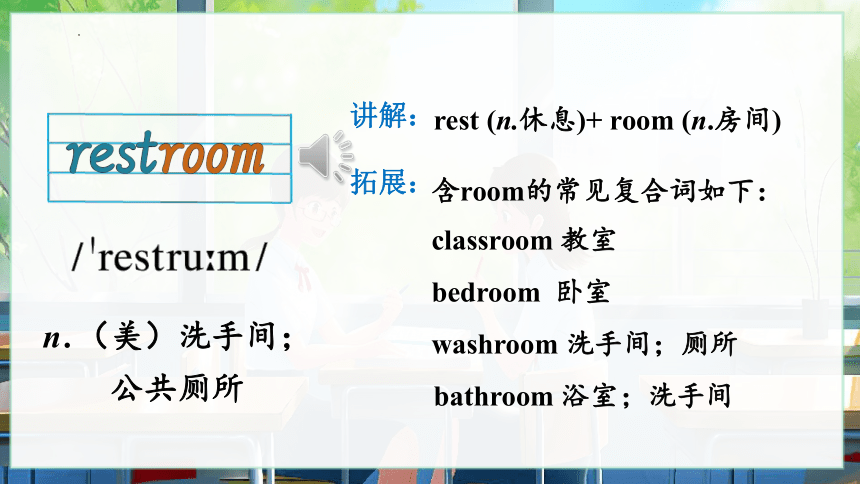
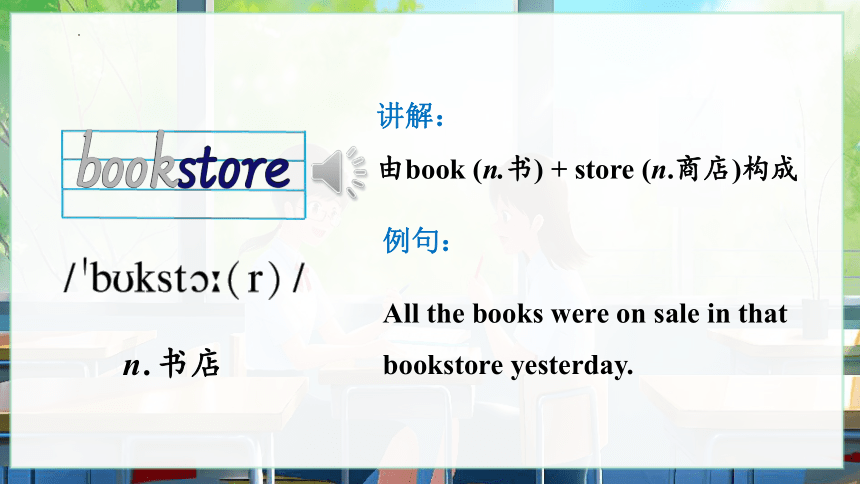
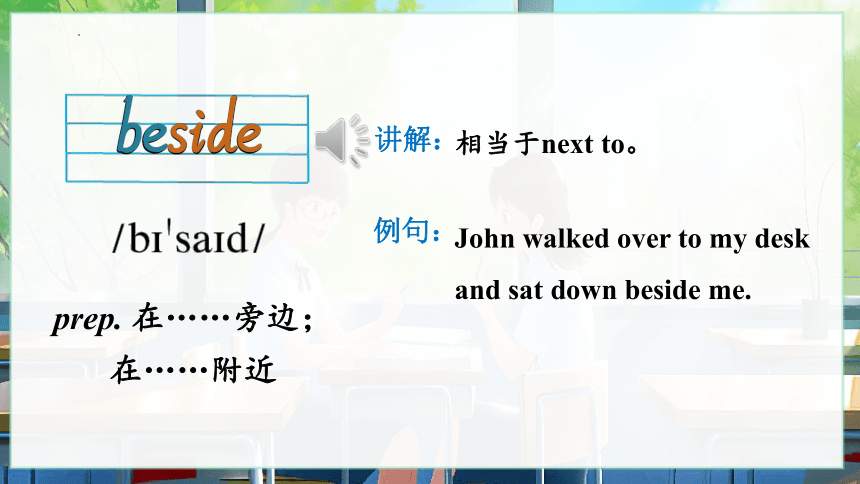
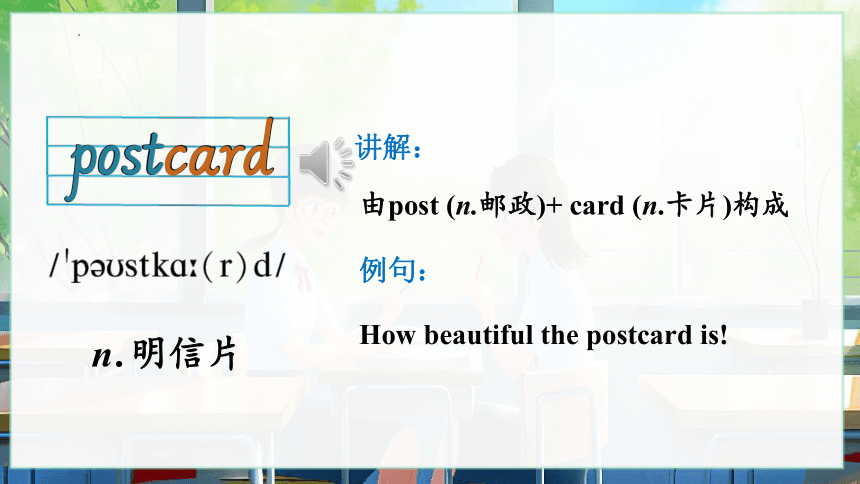
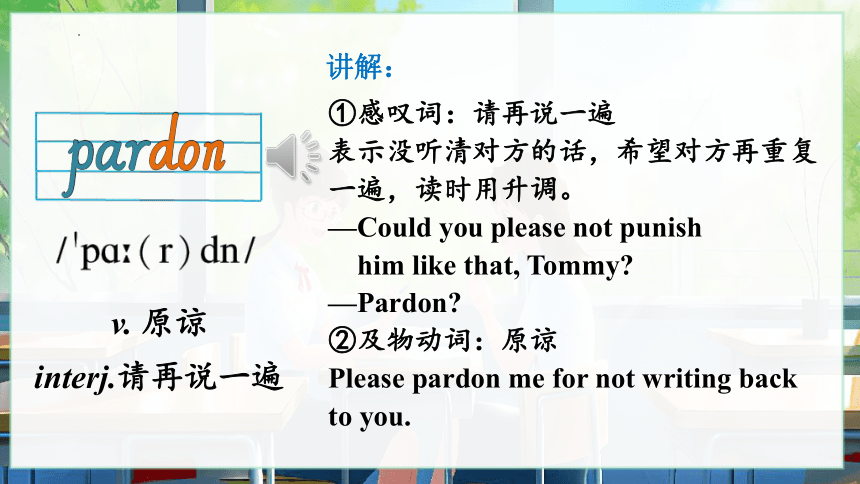
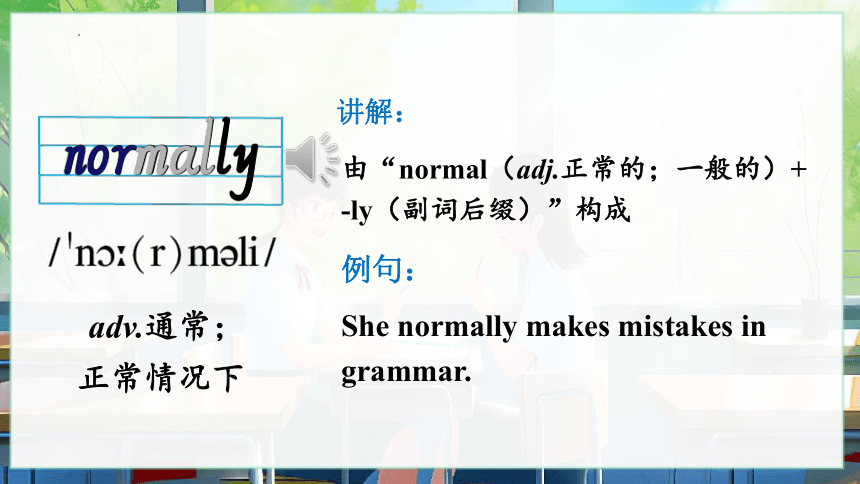
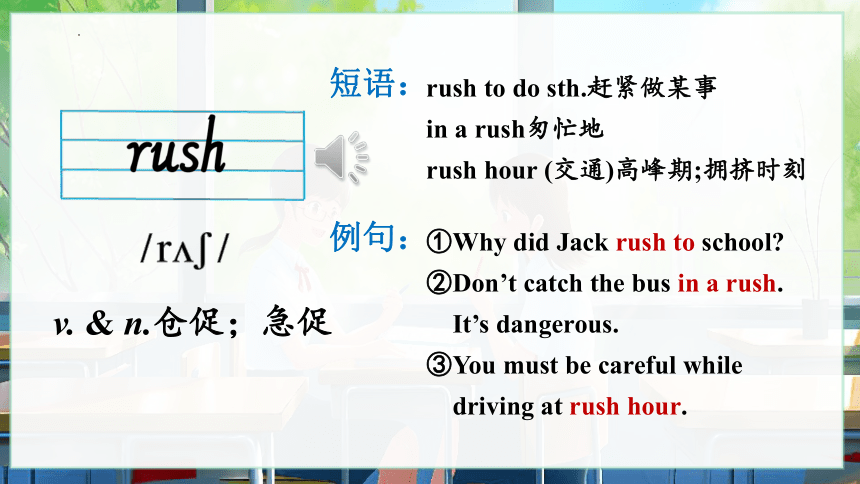

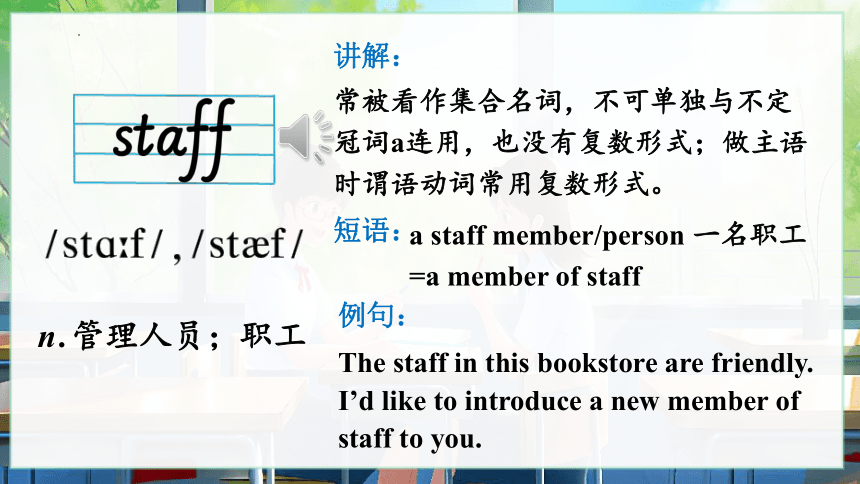
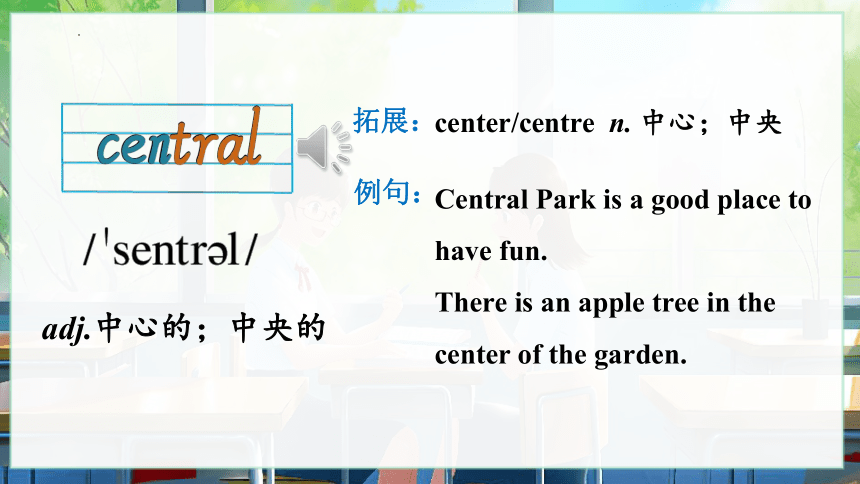
文档简介
(共75张PPT)
Unit 3
Could you please tell me where the restrooms are
人教版新目标 九年级上册
核心词汇和知识点讲解
核心词汇讲解
n.(美)洗手间; 公共厕所
含room的常见复合词如下:
拓展:
classroom 教室
bedroom 卧室
washroom 洗手间;厕所
bathroom 浴室;洗手间
rest (n.休息)+ room (n.房间)
讲解:
n.书店
All the books were on sale in that bookstore yesterday.
例句:
由book (n.书) + store (n.商店)构成
讲解:
prep. 在……旁边;
在……附近
相当于next to。
讲解:
John walked over to my desk and sat down beside me.
例句:
n.明信片
由post (n.邮政)+ card (n.卡片)构成
讲解:
How beautiful the postcard is!
例句:
v. 原谅
interj.请再说一遍
讲解:
①感叹词:请再说一遍
表示没听清对方的话,希望对方再重复一遍,读时用升调。
—Could you please not punish
him like that, Tommy
—Pardon
②及物动词:原谅
Please pardon me for not writing back to you.
adv.通常;
正常情况下
She normally makes mistakes in grammar.
例句:
由“normal(adj.正常的;一般的)+ -ly(副词后缀)”构成
讲解:
v. & n.仓促;急促
短语:
rush to do sth.赶紧做某事
in a rush匆忙地
rush hour (交通)高峰期;拥挤时刻
①Why did Jack rush to school
②Don’t catch the bus in a rush.
It’s dangerous.
③You must be careful while
driving at rush hour.
例句:
suggestion n. 建议;提议
v.建议;提议
短语:
suggest sth. (to sb.) (向某人)建议某事
suggest doing sth. 建议做某事
suggest +that从句 建议……
切记不能用 “suggest sb. to do sth.”!
注意:
拓展:
此时宾语从句用虚拟语气,即从句谓语动词用“ (should+)动词原形”
n.管理人员;职工
The staff in this bookstore are friendly.
I’d like to introduce a new member of staff to you.
例句:
a staff member/person 一名职工
=a member of staff
短语:
常被看作集合名词,不可单独与不定冠词a连用,也没有复数形式;做主语时谓语动词常用复数形式。
讲解:
center/centre n. 中心;中央
adj.中心的;中央的
Central Park is a good place to have fun.
There is an apple tree in the center of the garden.
例句:
拓展:
adj.意大利(人)的
n. 意大利人;意大利语
Julie is from Italy and she likes Italian food.
She is an Italian and she can speak English and Italian.
例句:
Italy n. 意大利
拓展
adj.附近的;邻近的
adv.在附近;附近
The kids at a nearby table are admiring the moon. (adj.)
Excuse me, is there a bookstore nearby (adv.)
例句:
v.邮寄;发电子邮件 n.邮件;信件
She mailed her father some mooncakes.
=She mailed some mooncakes to her father.
There isn’t too much mail today.
例句:
mail sb. sth.=mail sth. to sb.
给某人邮寄某物
短语:
adv.向东;朝东
adj.东方的;东部的
n.东;东方
Turn east, and then walk for half an hour. (adv.)
He lives on the east coast. (adj.)
China lies in the east of Asia. (n.)
例句:
拓展:
表示方向的其他词:
west 向西;西方的;西方
north 向北;北方的;北方
south 向南;南方的;南方
adj.迷人的;
极有吸引力的
①fascinated adj. 入迷的;极感兴趣的(主语通常是人)
拓展:
②fascination n. 魅力;极大的吸引力;入迷
③fascinate vt. 深深吸引;迷住
Central Park is fascinating all year round.
例句:
adj.不昂贵的
近义词:cheap 廉价的;便宜的
拓展:
反义词:expensive/dear 昂贵的
由否定前缀 in- + expensive构成
讲解:
英语中常见的否定前缀如下:
①dis-表示“分开;分离;不”。
like(喜欢)→dislike(不喜欢)
②in-(im-, ir-)表示“不,无”。
possible(可能的)→impossible(不可能的)
③un-表示“不,非”。
happy(高兴的)→unhappy(不高兴的)
adj.便利的;方便的
inconvenient adj.不方便的
拓展:
convenience n.方便;便利;便利的设施
It’s convenient (for sb.) to do... (对某人来说)做……很方便。
讲解:
例句:
It’s convenient for people to buy tickets online.
n.拐角;角落
例句:
There is a mall at/on the corner of the street.
You can find a chair in the corner of the room.
the corner of... ……的拐角处/角落
at/on the corner (of...) 在 (……的)拐角
in the corner (of...) 在(……的)角落里
短语:
adv.礼貌地;客气地
例句:
It’s a Chinese tradition to treat the old politely.
He always speaks to others impolitely. Nobody likes him.
Tom is a polite kid.
It’s impolite to talk with your mouth full.
拓展:
politely的相关词:
polite adj. 有礼貌的;客气的
impolite adj. 不礼貌的;粗鲁的
impolitely adv. 不礼貌地
由polite(adj. 有礼貌的;客气的)+-ly(副词后缀)构成
n. & v.要求;请求
request sth. (from sb.)
(向某人)请求某事/某物
request sb. to do sth.请求某人做某事
request + that 从句 请求……
①作名词时,多指比较正式的请求,其后常接介词for
The room is a bit small, so Carla made a request for a large one.
②作动词时,其常见用法如下:
讲解:
n.方向;方位
例句:
She went off in the direction of the cinema.
The visitors from all directions are having fun.
in the direction of…往/朝……的方向 all directions 四面八方;各方面
短语:
adj.正确的;恰当的
Your idea seems to be correct.
correct 还可作及物动词,意为改正;纠正;修正
拓展:
讲解:
相当于right。其副词形式为correctly,意为正确地。
She often helps me correct mistakes in grammar.
adj.直接的;直率的
例句:
If you spend more time with him, you will get used to his direct manner.
Excuse me, could you direct me to the station
indirect adj. 间接的directly adv.直接地direction n. 方向;方位director n.导演
拓展:direct的相关词
v.给(某人)指路;
指导;导演
例句:
He is an English speaker.
Our first speaker tonight is Billy.
n.讲(某种语言)的人;发言者
由speak(v.说话)+-er(名词后缀)构成
讲解:
动词加后缀-er或-or构成名词,表示动作的执行者。常见的词如下:
teach(v. 教;讲授)+-er→teacher 老师
act(v.表演)+-or→actor演员
拓展:
例句:
I don’t know who/whom he is waiting for.
To whom did you mail the postcard
pron.谁;什么人
讲解:
是who的宾格形式。在口语或非正式文体中,常用who来替换。但如果紧跟在介词后作宾语,则只能用whom。
n.住址;地址;通信处
例句:
Pardon me, could you tell me his address
adj.地下的 n.地铁
例句:
The clothes in the underground mall are inexpensive.
Every day she goes to work by underground.
由under (prep.在……下面) + ground (n.地面)构成
讲解:
核心知识点讲解
1.Excuse me, could you please tell me how to get to the bookstore 打扰一下,你能告诉我怎样到达书店吗?
(1) Excuse me. 是英语中常用的的客套用语,其意思根据不同情境理解为“请问”、“请原谅”、“不好意思,打扰一下”等。如:
Excuse me, just a minute, please. 对不起,稍等一下。
Excuse me, could you tell me how to get to No.1 Middle School
打扰了,你能告诉我怎样去第一中学吗?
Language points
(2) Could you please… “请你……好吗?”否定式为
“Could you please not…”“请你别……好吗”交际
用语,表示有礼貌的提出请求,后接动词原形。
Could you please tell me where the bookstore is
请你告诉我书店在哪里好吗?
Could you please not stand here 请别站在这儿好吗?
Could you please ________ us Mary's telephone number
A. to give B. give
C. giving D. to giving
B
--- Could you please tell me _____ the Bamboo Garden
--- The day after tomorrow, I think.
A. when will you visit
B. when you will visit
C. when would you visit
D. when you would visit
B
Could you please do sth.
Would/Will you please do sth.
Would you like to do sth.
May/Can/Could I do sth.
肯定回答常用:Sure./Of course./ No problem./ I’d love to.等。
否定回答常用:Sorry, I’d love/like to, but I…/
Sorry, I’m afraid …等。
拓 展
表示委婉请求及请求允许做某事的句型
2.Sure, just go along Main Street until you pass
Center Street.
当然,就沿着主街向前走,一直到你经过中心大街。
(1)go along 表示“沿着……向前走”多指沿着街
道、河边或堤坝等向前走,指路常用语。
go down也表示“沿着……向前走”,但其多
指向低处走,或向郊区走。
Go along this street, and you will find the park in the end.
沿着这条街向前走,在路的尽头你会找到那个公园。
Turn left/right at… 在……往左/往右转。
Turn right at the third crossing, and then walk straight.
在第三个十字路口往右转,然后朝前直走。
Take the first/second…turning on the right/left.
在第一/二……个拐弯处往右、左拐。
Take the second turning on the right.
在第二个拐弯处往右拐。
拓 展
常见的指路表达方式
It’s across from/near/next to …
它就在……对面/附近/旁边。
It’s across from/near/next to the hospital.
他就在医院对面/附近/旁边。
You can take the NO. …bus and get off at…
你可以乘……路公共汽车在……下车。
You can take the NO.3 bus and get off at the National Park Stop.
你可以乘3路公共汽车在国家公园站下车。
3. I’m excited to try the rides!
be excited to do sth. 对做...感到兴奋
She was excited to learn the news.
她听到这消息很兴奋。
be excited about sth. / doing sth. 对 ... 感到兴奋
Are you excited about your new job
你对新工作感到兴奋吗?
You must be excited about leaving for America.
你对去美国一定很兴奋。
excited 与 exciting 的区别
在句子中都可以用作定语或表语,但它们的意思和在句中的用法有差异。 excited意为“兴奋的”,一般修饰人;而 exciting 意为“令人感到兴奋的”,一般修饰物。例如:
Was it an exciting match
Are you excited about going to Beijing
知识链接
类似词语有:
interested / interesting 感兴趣的/有趣的
moved / moving 感动的/令人感动的
surprised / surprising 感到惊奇的/使人惊奇的
pleased / pleasing 高兴的/令人高兴的
bored / boring 厌烦的/令人厌烦的
tired / tiring 厌倦的/令人厌倦的
amazed / amazing 惊奇的/令人惊奇的
frightened / frightening 受惊恐的/令人惊恐的
puzzled / puzzling 迷惑的/令人迷惑的
1). That is a _______ problem.
We are all ______ to death. ( bore)
2). I like the colours that are _______ to the eyes.
The teacher is ________ at the good news. (please )
3). We are all _________ in the storybook.
There is an _________ program on TV tonight. (interest )
boring
用每题后括号中所给单词的适当形式填空。
bored
pleasing
pleased
interested
interesting
1. Go past the bookstore.
经过书店。句中的past是介词,意为“经过”,常和walk, run, go等表示位移的动词连用。
past
词性 词义 例句
副词 经过 The cars go past once an hour.
名词 过去(常与the连用) We cannot change the past.
形容词 过去的 Forget those past unhappy things.
辨析:past, over, across与through
The man walked past a shop. 这个人走过一家商店。
There is a bridge over the river. 河上面有座桥。
The little boy is walking across the road. 这个小男孩正在步行穿过马路。
He can go through the forest by himself. 他能独自穿过森林。
past 经过
over 跨越
across 横穿
through 穿过
past 经过;晚于 表示空间上“经过”或时间上“在……之后”
over 从……上方跨过 表示空间范围上“越过”
across 横穿;越过 表示动作是在某一物体表面进行的,强调从一端到另一端
through 穿过;越过 表示动作是在某一空间内进行的,强调从内部穿过
2. I’m excited to try the rides!
我很兴奋来尝试这些游乐设施!excited作形容词,意为“激动的;兴奋的”,常用来描述人的感受。
excited & exciting
excited意为“激动的;兴奋的”。作表语时,主语通常是人;作定语时,常用来修饰人。
e.g. Steve will fly home tomorrow. We’re all excited when hearing the news.The excited fans are waiting (等待) for the singer to arrive.
Language points
3. Pardon 什么 (教材P18 2d)
(1)pardon在此处作感叹词,常用于表示没有听清楚或不理解对方所说的内容,请求对方再重复一遍,语气比较委婉,读时用升调;也可用于表示歉意。“Pardon ”相当于“I beg your pardon ”或“Pardon me ”。
_______ I didn’t catch what you said.
如:原谅我没听懂你说的话。
Pardon
(2)pardon还可作及物动词,意为“原谅”。pardon sb. for ( doing) sth. _________________。
原谅某人(做)某事
如:请原谅我的无知,但欧佩克代表什么?
___________________, but what does OPEC stand for
Pardon my ignorance
4. Right, we normally say “toilets” or “washrooms”.(教材P18 2d)
(1)normally 作副词,意为__________________。由“normal (adj. 正常的)+ -ly(后缀)“构成。
It __________ takes 10 minutes to get there.
__________, every hour you ride, you need to pay one yuan.
通常情况下,每骑一小时,你需要支付一元钱。
如:到那里通常需要10分钟。
(2)normal作形容词,意为__________,可作定语或表语。
He’s been used to ________ working hours from nine to five.
如:他已经习惯了从九点到五点的正常工作时间。
“通常;正常情况下”
normally
Normally
“正常的”
normal
5. You don’t need to rush!(教材P18 2d)
(1)rush在此处作动词,意为__________________ 。rush to do sth. ____________________。
He ______________ the room when the bell rang.
如:铃响时,他冲出了房间。
He ______________ his friend.
他冲过去帮助他的朋友。
(2)rush还可作名词,意为“仓促;匆忙” 。in a rush _______________。
When you’re __________, it's easier to make mistakes.
如:当你匆忙时,更容易犯错误。
别担心,不用着急。
Don’t worry ,there’s ___________.
“仓促;急促”
“赶忙做某事”
rushed out of
rushed to help
“仓促,匆忙”
in a rush
no rush
1. I was scared at first, but shouting really did help.
强调do的用法:
Point
助动词did放在动词原形前,在句中起强调作用,用来表达说话者的一种强烈的感情。did要重读, 后接动词原形,意为“确实,一定,务必,的确”等。do随主语的人称、数和句子的时态的变化而变化。
* I was scared at first, but shouting really helped.
* I was scared at first, but shouting really did help. (强调句)
Language points
Do come to my birthday party. 一定来参加我的生日宴会。
Do be careful when you cross the street. 过马路时务必要小心。
Explaination
1) until与否定词连用, 即用在否定句, 谓语动词通常是瞬间性动词, 表示“直到……才……”。eg:
You can't go home until you finish your homework.
直到你完成家庭作业才能回家。
2) until用在肯定句, 谓语动词通常是延续性动词, 表示“到…为止”。
Let’s wait until the rain stops. 咱们等到雨停为止吧。
2. You never know until you try something.
until的用法:
Point
Language points
Explaination
【注意】
当主句表示将来的动作时, until引导的时间状语从句通常用一般现在时, 即所谓的 “主将从现”。eg:
I'll wait for you there until you arrive.
我将在那里一直等到你来。
I won't leave until you do. 你不走我就不走。
Don't leave until I come back. 在我回来之前不要离开。
Language points
Explaination
suggest v. “建议; 提议”, 其用法为:
Point
3. I suggest Water City Restaurant in Water World.
① suggest sth. (to sb.) 向某人提议/建议某事
e.g. He suggested a walk.
② suggest doing sth. “建议做某事”, e.g.
She suggested going there by bike.
③ suggest sb.'s doing sth. = advise sb. to do sth. “建议某人做某事”
③ suggest+that从句, 意为 “建议…”, 从句要用虚拟语气, 即谓语用
“(should)+动词原形”。e.g.
He suggested (that) we (should) do it at once.
Language points
Explaination
拓展
suggest还可译为“暗示;表明”。
e.g.:His pale face suggested that he was ill.
① suggest的名词形式为suggestion, 意为“建议, 提议”, 为可数名词,
其同义词advice为不可数名词, make a suggestion “提个建议” 。
② 表示“建议某人做某事”, 可用suggest sb.’s doing sth. /suggest sb.
doing sth. /advise sb. to do sth., 但不能用suggest sb. to do sth.
He suggested us going out for a walk. 他建议我们出去走走。
= He suggested our going out for a walk.
= He advised us to go out for a walk.
Language points
Explaination
4. On their way to ..., Alice and He Wei pass by Uncle Bob’s.
e.g. Yesterday I met a friend of mine on my way to school.
【拓展】常见的与way相关的短语还有:
by the way 顺便说一下, 顺便问一下
in a way 在某种程度上
in the way 挡路, 妨碍(某人)
in this way 这样, 通过这种方法
lose one’s way 迷路
on one’s way to... 表示 “在去……的路上”。
Point
Language points
Explaination
其同义词为walk/go past。
eg: I pass by a hospital on my way to school.
He tells me he will pass by our city after several weeks.
他告诉我也许他在几周后要路过我们城市。
pass by还有“疏忽, 时间消失”的意思。eg:
Time pass by. (时间在流逝。)
You should never let an opportunity pass by.
你不应该错过任何机会.
pass by表示 “经过某地”或 “从某人旁边走过”。
Point
4. On their way to ..., Alice and He Wei pass by Uncle Bob’s.
Explaination
Language points
Uncle Bob’s 表示 “鲍勃叔叔的餐馆”。
Point
在英语中, 表示某人的店铺或住所的名词所有格, 常省去所有格之后的名词,如:shop, house, home等。
The baker's is on the side of the street. 理发馆在街道的另一边.
My uncle's is not very far from here. 我叔叔的家离这儿不太远.
-Where s Li Hai. do you know -He's at Mr Smith's for dinner.
On New Year s Eve. we all got together at Grandpa's.
除夕夜.我们都聚集在爷爷家.
4. On their way to ..., Alice and He Wei pass by Uncle Bob’s.
Language points
Explaination
5. Let's ask what time the band starts playing.
start doing sth. 意为“开始做某事”。
Point
【拓展】作“开始”讲时, start与begin二者可互换, 但以下几种情况只能用start, 不能用begin。
(1) 表示“创办, 开设”时。
e.g. He started a new shop last year.
(2) 表示“(机器)开动”时。
e.g. Can you start the car
(3) 表示“出发, 动身”时。
e.g. We started early in the morning.
Language points
Explaination
6. Alice and He Wei walk up to a staff person at the door.
staff “全体职员,管理人员”的用法。
Point
(1) staff 指“工作人员”的总称时, 是集合名词, 不用复数。a staff 不是指 “一个人员”, 而是指某一个单位的 “全体人员”, two staffs不是指 “两个人员”, 而是指某两个单位的 “全体人员”。要表示“一个职员, 一个工作人员”, 可说成 a staff member, a staff person 或one of the staff。但如果是复数, 则其中的members可以省略。
On every trip a staff member brings musical instruments.
每一次旅行时, 一个工作人员都会携带乐器。
I have ten staff (members) working for me. 我手下有十名职员。
(2) 作主语时,如强调整体,谓语动词用单数,如强调其成员个人,谓语动词用复数。
The school's teaching staff is/are excellent. 学校师资很不错。
Over half of the staff is female. 半数以上的职工是女性。
Language points
Explaination
7. The restaurant is always busy at that time, so come a little earlier
to get a table.
◆ 句中a little的意思是 “一点”, 修饰副词的比较级earlier。
eg: You’d better get up a little earlier to catch the first bus.
为了赶上早班车, 你最好早点起床。
【拓展】even, a bit, a lot, much, far也可以修饰比较级。
eg: This car is much more expensive than that one.
这辆车比那辆贵多了。
Language points
Explaination
◆ 动词不定式to get a table作状语, 表示目的。
eg: She studies hard to get good grades.
她努力学习为了取得好成绩。
get a table : 定餐桌;占位子
Language points
7. The restaurant is always busy at that time, so come a
little earlier to get a table.
Explaination
1.fascinating adj. 迷人的;极有吸引力的
fascinating作形容词,常在句中作表语或定语。作表语时,主语通常为物。
Language points
例:Beijing is a fascinating old city full of ancient buildings.
The students were fascinated by his ideas.
Old castles have a certain strange fascination for me.
Anything to do with the old house fascinates me.
拓展:其名词形式是fascination,意为“魅力;入迷”;动词形式fascinate,意为“迷住,深深吸引”;fascinated也是形容词形式,意为“入迷的,极感兴趣的”。
2.convenient 便利的;方便的
convenient作形容词,主语通常为物,其反义词为inconvenient,意为“不方便的;不便利的”。It is convenient (for sb. ) to do sth.意为“(对某人来说)做某事很方便”。
例:Please come to see us when it is convenient for you.
It is convenient to do shopping online using Alipay and WeChat.
The house has all the modern conveniences.
拓展:convenience是convenient的名词形式,既可作可数名词,意为“便利的设施”,也可作不可数名词,意为“方便,便利”。
【语境应用】单项选择
1) Traveling around big cities by taxi can cost a lot of money, but it’s usually ________ to take the underground train to most places.
A. amazing B. expensive
C. convenient D. exciting
2) It is ________ for me to go shopping. There is a new supermarket near my home.
A. difficult B. important
C. impossible D. convenient
C
D
3.inexpensive 不昂贵的 uncrowded不拥挤的
inexpensive形容词,意为“不昂贵的”,其同义词为 cheap,反义词为expensive/dear。
uncrowded形容词,意为“不拥挤的; 人少的”,其反义词为crowded。
inexpensive是由expensive加上否定前缀in-构成的。
uncrowded是由crowded加上否定前缀un-构成的。
例:The sweater is inexpensive.这件毛衣不贵。
例:The beaches here are surprisingly uncrowded.
出人意料的是这儿的海滩人不多。
2. inexpensive 不昂贵的,便宜的
inexpensive形容词,意为“不昂贵的”,其同义词为 cheap,反义词为 expensive/dear。
inexpensive是由expensive加上否定前缀in-构成的。
The sweater is inexpensive.这件毛衣不贵。
① dis-表示“不;非;相反”,如:
like喜欢 — dislike 不喜欢 agree 同意—disagree 不同意。
② in-(im-,ir-)表示“不;非”,如:
expensive 昂贵的— inexpensive便宜的; polite礼貌的— impolite不礼貌的;
regular有规律的— irregular无规律的。
③un-表示“不,非”,如:
able有能力的 — unable无能力的;like像—unlike不像;
crowded拥挤的 — uncrowded不拥挤的;
拓展:英语中常见的否定前缀:
① dis-表示“不;非;相反”,
如:like喜欢 — dislike不喜欢;
agree同意 — disagree不同意。
② in-/im-/ir-表示“不;非”,
如:expensive昂贵的 — inexpensive 不昂贵的;
polite礼貌的 — impolite不礼貌的;
regular有规律的 — irregular无规律的。
③ un-表示“不,非”,
如:able有能力的 — unable无能力的;
like 像 — unlike不像;
crowded拥挤的 — uncrowded不拥挤的。
陈述句中如果有带否定前缀或后缀的单词, 整个句子仍被视为肯定句,反意疑问部分用否定形式。
She is unhappy, isn’t she
她不高兴,是吗?
… and the clerk tells her to go to the corner of Market and Middle Streets.……工作人员告诉她去市场大街和中心大街交汇的拐角处。
corner是可数名词,意为“拐角;角落”。常构成短语:
①in the corner of ...意为“在......的拐角处/角落里”。
I found a boy crying in the corner of
the room. 我发现一个男孩在房间的角落
里哭。
②on/at the corner意为“在拐角处”。
The shop is on the corner.
那家商店在拐角处。
on/at the corner
在拐角处
in the corner
在角落里
Language points
1. …are similar requests for directions to a place.
(1)request可数名词,其后常跟for,意为“要求/请求……”request可用作及物动词,其用法有:①request sth. (from sb.)向某人请求……
②request sb. to do sth. 请求某人做某事。
③request+ that从句(从句用虚拟语气)
Language points
(2) direction n. 方向;方位
Which direction does your room face
ask for directions 问路;请教,请求指导
follow sb’s directions 听从某人的指教(指示,指挥)
keep sb’s directions in mind 记住某人的指示(指导)
give directions 发出指示 in all directions 四面八方
in every direction 四面八方 in the direction of 朝……方向
3. Both are correct, but the first one sounds less polite.
less + adj. / adv. “不那么,稍许不......”
less + than + 比较的对象
His second movie is less interesting, I think.
我认为他的第二部影片就不那么有趣。
I was less angry than surprised.
我并不那么生气,更多的是惊讶。
adj.
比较对象
4. The expressions they use might depend on whom they are speaking to or how well they know each other.
他们使用的表情很可能取决于说话的对象以及亲密程度。
(2) whom宾格人称代词, 意为“谁; 什么人”, 在句中作及物动词或介词的宾语。
①在口语和非正式用法中, whom放在句首时,常常被who所代替。例如: Who/Whom is he talking to
②若whom紧跟在介词之后,则不可被who所代替。例如: He is a man from whom we should all learn.
(1)depend on +名词/代词/宾语从句: “视……而定,取决于……”
① The price of this kind of product depends on its quality instead of its size.
这种产品的价格取决于它的质量而不是它的大小。
② It all depend on whether he likes the boss or not.
这完全取决于他是否喜欢这个老板。
5. Sometimes we even need to spend time leading in to a request.
spend表示“花费”的两种常见结构
(1)spend+时间/金钱+(in)doing sth.
(2)spend+时间/金钱+on sth.
Spend… doing sth. 花费……做某事
如何表达“花费”:
(1) + spend+ / +on sth. /(in)doing sth.
(2) +pay+ +for sth.
(3)sth. +cost+ +
(4)It takes+ / +to do sth.
6. However, it is important to learn how to use the right language in different situations. it作形式主语
在英语中, 如果主语是较长的动词不定式或一个句子, 为了保持句子结构的平衡, 避免头重脚轻, 通常用it作形式主语放在句首, 而把真正的主语放在句尾。
常见的句型有:
It is + adj. (+ ____ + sb.) + to do sth.。常用于此句型的形容词important,
difficult, dangerous, necessary, useful, possible等, 用来对to do sth. 进行说明
如:It’s difficult for us to finish the work in an hour.
for
2) It is + adj. + ____ + sb. + to do sth.
常用于此句型的形容词有good, kind, nice, clever, wise等, 用来对sb.的性
格、品质等进行说明。
如:It’s kind of you to say so.
of
7. They include expressions such as “Could you please ... ” or “May I ask ... ”
include作及物动词,意为“包括;包含”。
including用作介词,意为“包括;包含在内”,后接名词、代词或动词-ing形式。
included形容词,意为“包括在内的”,通常置于名词之后。
【运用】(1)这个价格包括房子和里面的家具。 _________________________
(2)事故中有6人受伤,其中包括一名婴儿。________________________
(3)这所学校有100个人,包括20名老师。
____________________
The price includes both the house and the furniture inside.
Six people, including a baby, were injured in the accident.
There are 100 people in this school, 20 teachers included.
8. When you visit a foreign country, it is important to know how to ask for help politely.
politely作副词,意为“礼貌地;客气地”,其反义词为impolitely(无礼地;粗鲁地);polite是其形容词形式,反义词为impolite(无礼的)。常用结构:be polite to sb. 意为“对某人有礼貌”。It's polite to do sth. 意为“做某事是有礼貌的”
【运用】(1) 玛丽对她的老师很有礼貌。 _________________________
(2) 为别人开门是礼貌的。________________________
(3) 那个小男孩客气地向我寻求帮助。
____________________
Mary is polite to her teachers.
It’s polite to open doors for others.
The little boy asked me for help politely.
9. These are similar requests for directions.
request可数名词,其后常跟for,意为“要求/请求…”
request可用作及物动词,其用法有:
①request sth.(from sb.)向某人请求…
②request sb. to do sth.请求某人做某事。
③request+that从句(从句用虚拟语气)
【运用】(1)他向我要了些热水。 _________________________
(2)他们要求他立刻离幵。________________________
(3)我请她早一小时来。
____________________
He requested some hot water from me.
They requested him to leave at once.
I requested that she (should) come an hour earlier.
Unit 3
Could you please tell me where the restrooms are
人教版新目标 九年级上册
核心词汇和知识点讲解
核心词汇讲解
n.(美)洗手间; 公共厕所
含room的常见复合词如下:
拓展:
classroom 教室
bedroom 卧室
washroom 洗手间;厕所
bathroom 浴室;洗手间
rest (n.休息)+ room (n.房间)
讲解:
n.书店
All the books were on sale in that bookstore yesterday.
例句:
由book (n.书) + store (n.商店)构成
讲解:
prep. 在……旁边;
在……附近
相当于next to。
讲解:
John walked over to my desk and sat down beside me.
例句:
n.明信片
由post (n.邮政)+ card (n.卡片)构成
讲解:
How beautiful the postcard is!
例句:
v. 原谅
interj.请再说一遍
讲解:
①感叹词:请再说一遍
表示没听清对方的话,希望对方再重复一遍,读时用升调。
—Could you please not punish
him like that, Tommy
—Pardon
②及物动词:原谅
Please pardon me for not writing back to you.
adv.通常;
正常情况下
She normally makes mistakes in grammar.
例句:
由“normal(adj.正常的;一般的)+ -ly(副词后缀)”构成
讲解:
v. & n.仓促;急促
短语:
rush to do sth.赶紧做某事
in a rush匆忙地
rush hour (交通)高峰期;拥挤时刻
①Why did Jack rush to school
②Don’t catch the bus in a rush.
It’s dangerous.
③You must be careful while
driving at rush hour.
例句:
suggestion n. 建议;提议
v.建议;提议
短语:
suggest sth. (to sb.) (向某人)建议某事
suggest doing sth. 建议做某事
suggest +that从句 建议……
切记不能用 “suggest sb. to do sth.”!
注意:
拓展:
此时宾语从句用虚拟语气,即从句谓语动词用“ (should+)动词原形”
n.管理人员;职工
The staff in this bookstore are friendly.
I’d like to introduce a new member of staff to you.
例句:
a staff member/person 一名职工
=a member of staff
短语:
常被看作集合名词,不可单独与不定冠词a连用,也没有复数形式;做主语时谓语动词常用复数形式。
讲解:
center/centre n. 中心;中央
adj.中心的;中央的
Central Park is a good place to have fun.
There is an apple tree in the center of the garden.
例句:
拓展:
adj.意大利(人)的
n. 意大利人;意大利语
Julie is from Italy and she likes Italian food.
She is an Italian and she can speak English and Italian.
例句:
Italy n. 意大利
拓展
adj.附近的;邻近的
adv.在附近;附近
The kids at a nearby table are admiring the moon. (adj.)
Excuse me, is there a bookstore nearby (adv.)
例句:
v.邮寄;发电子邮件 n.邮件;信件
She mailed her father some mooncakes.
=She mailed some mooncakes to her father.
There isn’t too much mail today.
例句:
mail sb. sth.=mail sth. to sb.
给某人邮寄某物
短语:
adv.向东;朝东
adj.东方的;东部的
n.东;东方
Turn east, and then walk for half an hour. (adv.)
He lives on the east coast. (adj.)
China lies in the east of Asia. (n.)
例句:
拓展:
表示方向的其他词:
west 向西;西方的;西方
north 向北;北方的;北方
south 向南;南方的;南方
adj.迷人的;
极有吸引力的
①fascinated adj. 入迷的;极感兴趣的(主语通常是人)
拓展:
②fascination n. 魅力;极大的吸引力;入迷
③fascinate vt. 深深吸引;迷住
Central Park is fascinating all year round.
例句:
adj.不昂贵的
近义词:cheap 廉价的;便宜的
拓展:
反义词:expensive/dear 昂贵的
由否定前缀 in- + expensive构成
讲解:
英语中常见的否定前缀如下:
①dis-表示“分开;分离;不”。
like(喜欢)→dislike(不喜欢)
②in-(im-, ir-)表示“不,无”。
possible(可能的)→impossible(不可能的)
③un-表示“不,非”。
happy(高兴的)→unhappy(不高兴的)
adj.便利的;方便的
inconvenient adj.不方便的
拓展:
convenience n.方便;便利;便利的设施
It’s convenient (for sb.) to do... (对某人来说)做……很方便。
讲解:
例句:
It’s convenient for people to buy tickets online.
n.拐角;角落
例句:
There is a mall at/on the corner of the street.
You can find a chair in the corner of the room.
the corner of... ……的拐角处/角落
at/on the corner (of...) 在 (……的)拐角
in the corner (of...) 在(……的)角落里
短语:
adv.礼貌地;客气地
例句:
It’s a Chinese tradition to treat the old politely.
He always speaks to others impolitely. Nobody likes him.
Tom is a polite kid.
It’s impolite to talk with your mouth full.
拓展:
politely的相关词:
polite adj. 有礼貌的;客气的
impolite adj. 不礼貌的;粗鲁的
impolitely adv. 不礼貌地
由polite(adj. 有礼貌的;客气的)+-ly(副词后缀)构成
n. & v.要求;请求
request sth. (from sb.)
(向某人)请求某事/某物
request sb. to do sth.请求某人做某事
request + that 从句 请求……
①作名词时,多指比较正式的请求,其后常接介词for
The room is a bit small, so Carla made a request for a large one.
②作动词时,其常见用法如下:
讲解:
n.方向;方位
例句:
She went off in the direction of the cinema.
The visitors from all directions are having fun.
in the direction of…往/朝……的方向 all directions 四面八方;各方面
短语:
adj.正确的;恰当的
Your idea seems to be correct.
correct 还可作及物动词,意为改正;纠正;修正
拓展:
讲解:
相当于right。其副词形式为correctly,意为正确地。
She often helps me correct mistakes in grammar.
adj.直接的;直率的
例句:
If you spend more time with him, you will get used to his direct manner.
Excuse me, could you direct me to the station
indirect adj. 间接的directly adv.直接地direction n. 方向;方位director n.导演
拓展:direct的相关词
v.给(某人)指路;
指导;导演
例句:
He is an English speaker.
Our first speaker tonight is Billy.
n.讲(某种语言)的人;发言者
由speak(v.说话)+-er(名词后缀)构成
讲解:
动词加后缀-er或-or构成名词,表示动作的执行者。常见的词如下:
teach(v. 教;讲授)+-er→teacher 老师
act(v.表演)+-or→actor演员
拓展:
例句:
I don’t know who/whom he is waiting for.
To whom did you mail the postcard
pron.谁;什么人
讲解:
是who的宾格形式。在口语或非正式文体中,常用who来替换。但如果紧跟在介词后作宾语,则只能用whom。
n.住址;地址;通信处
例句:
Pardon me, could you tell me his address
adj.地下的 n.地铁
例句:
The clothes in the underground mall are inexpensive.
Every day she goes to work by underground.
由under (prep.在……下面) + ground (n.地面)构成
讲解:
核心知识点讲解
1.Excuse me, could you please tell me how to get to the bookstore 打扰一下,你能告诉我怎样到达书店吗?
(1) Excuse me. 是英语中常用的的客套用语,其意思根据不同情境理解为“请问”、“请原谅”、“不好意思,打扰一下”等。如:
Excuse me, just a minute, please. 对不起,稍等一下。
Excuse me, could you tell me how to get to No.1 Middle School
打扰了,你能告诉我怎样去第一中学吗?
Language points
(2) Could you please… “请你……好吗?”否定式为
“Could you please not…”“请你别……好吗”交际
用语,表示有礼貌的提出请求,后接动词原形。
Could you please tell me where the bookstore is
请你告诉我书店在哪里好吗?
Could you please not stand here 请别站在这儿好吗?
Could you please ________ us Mary's telephone number
A. to give B. give
C. giving D. to giving
B
--- Could you please tell me _____ the Bamboo Garden
--- The day after tomorrow, I think.
A. when will you visit
B. when you will visit
C. when would you visit
D. when you would visit
B
Could you please do sth.
Would/Will you please do sth.
Would you like to do sth.
May/Can/Could I do sth.
肯定回答常用:Sure./Of course./ No problem./ I’d love to.等。
否定回答常用:Sorry, I’d love/like to, but I…/
Sorry, I’m afraid …等。
拓 展
表示委婉请求及请求允许做某事的句型
2.Sure, just go along Main Street until you pass
Center Street.
当然,就沿着主街向前走,一直到你经过中心大街。
(1)go along 表示“沿着……向前走”多指沿着街
道、河边或堤坝等向前走,指路常用语。
go down也表示“沿着……向前走”,但其多
指向低处走,或向郊区走。
Go along this street, and you will find the park in the end.
沿着这条街向前走,在路的尽头你会找到那个公园。
Turn left/right at… 在……往左/往右转。
Turn right at the third crossing, and then walk straight.
在第三个十字路口往右转,然后朝前直走。
Take the first/second…turning on the right/left.
在第一/二……个拐弯处往右、左拐。
Take the second turning on the right.
在第二个拐弯处往右拐。
拓 展
常见的指路表达方式
It’s across from/near/next to …
它就在……对面/附近/旁边。
It’s across from/near/next to the hospital.
他就在医院对面/附近/旁边。
You can take the NO. …bus and get off at…
你可以乘……路公共汽车在……下车。
You can take the NO.3 bus and get off at the National Park Stop.
你可以乘3路公共汽车在国家公园站下车。
3. I’m excited to try the rides!
be excited to do sth. 对做...感到兴奋
She was excited to learn the news.
她听到这消息很兴奋。
be excited about sth. / doing sth. 对 ... 感到兴奋
Are you excited about your new job
你对新工作感到兴奋吗?
You must be excited about leaving for America.
你对去美国一定很兴奋。
excited 与 exciting 的区别
在句子中都可以用作定语或表语,但它们的意思和在句中的用法有差异。 excited意为“兴奋的”,一般修饰人;而 exciting 意为“令人感到兴奋的”,一般修饰物。例如:
Was it an exciting match
Are you excited about going to Beijing
知识链接
类似词语有:
interested / interesting 感兴趣的/有趣的
moved / moving 感动的/令人感动的
surprised / surprising 感到惊奇的/使人惊奇的
pleased / pleasing 高兴的/令人高兴的
bored / boring 厌烦的/令人厌烦的
tired / tiring 厌倦的/令人厌倦的
amazed / amazing 惊奇的/令人惊奇的
frightened / frightening 受惊恐的/令人惊恐的
puzzled / puzzling 迷惑的/令人迷惑的
1). That is a _______ problem.
We are all ______ to death. ( bore)
2). I like the colours that are _______ to the eyes.
The teacher is ________ at the good news. (please )
3). We are all _________ in the storybook.
There is an _________ program on TV tonight. (interest )
boring
用每题后括号中所给单词的适当形式填空。
bored
pleasing
pleased
interested
interesting
1. Go past the bookstore.
经过书店。句中的past是介词,意为“经过”,常和walk, run, go等表示位移的动词连用。
past
词性 词义 例句
副词 经过 The cars go past once an hour.
名词 过去(常与the连用) We cannot change the past.
形容词 过去的 Forget those past unhappy things.
辨析:past, over, across与through
The man walked past a shop. 这个人走过一家商店。
There is a bridge over the river. 河上面有座桥。
The little boy is walking across the road. 这个小男孩正在步行穿过马路。
He can go through the forest by himself. 他能独自穿过森林。
past 经过
over 跨越
across 横穿
through 穿过
past 经过;晚于 表示空间上“经过”或时间上“在……之后”
over 从……上方跨过 表示空间范围上“越过”
across 横穿;越过 表示动作是在某一物体表面进行的,强调从一端到另一端
through 穿过;越过 表示动作是在某一空间内进行的,强调从内部穿过
2. I’m excited to try the rides!
我很兴奋来尝试这些游乐设施!excited作形容词,意为“激动的;兴奋的”,常用来描述人的感受。
excited & exciting
excited意为“激动的;兴奋的”。作表语时,主语通常是人;作定语时,常用来修饰人。
e.g. Steve will fly home tomorrow. We’re all excited when hearing the news.The excited fans are waiting (等待) for the singer to arrive.
Language points
3. Pardon 什么 (教材P18 2d)
(1)pardon在此处作感叹词,常用于表示没有听清楚或不理解对方所说的内容,请求对方再重复一遍,语气比较委婉,读时用升调;也可用于表示歉意。“Pardon ”相当于“I beg your pardon ”或“Pardon me ”。
_______ I didn’t catch what you said.
如:原谅我没听懂你说的话。
Pardon
(2)pardon还可作及物动词,意为“原谅”。pardon sb. for ( doing) sth. _________________。
原谅某人(做)某事
如:请原谅我的无知,但欧佩克代表什么?
___________________, but what does OPEC stand for
Pardon my ignorance
4. Right, we normally say “toilets” or “washrooms”.(教材P18 2d)
(1)normally 作副词,意为__________________。由“normal (adj. 正常的)+ -ly(后缀)“构成。
It __________ takes 10 minutes to get there.
__________, every hour you ride, you need to pay one yuan.
通常情况下,每骑一小时,你需要支付一元钱。
如:到那里通常需要10分钟。
(2)normal作形容词,意为__________,可作定语或表语。
He’s been used to ________ working hours from nine to five.
如:他已经习惯了从九点到五点的正常工作时间。
“通常;正常情况下”
normally
Normally
“正常的”
normal
5. You don’t need to rush!(教材P18 2d)
(1)rush在此处作动词,意为__________________ 。rush to do sth. ____________________。
He ______________ the room when the bell rang.
如:铃响时,他冲出了房间。
He ______________ his friend.
他冲过去帮助他的朋友。
(2)rush还可作名词,意为“仓促;匆忙” 。in a rush _______________。
When you’re __________, it's easier to make mistakes.
如:当你匆忙时,更容易犯错误。
别担心,不用着急。
Don’t worry ,there’s ___________.
“仓促;急促”
“赶忙做某事”
rushed out of
rushed to help
“仓促,匆忙”
in a rush
no rush
1. I was scared at first, but shouting really did help.
强调do的用法:
Point
助动词did放在动词原形前,在句中起强调作用,用来表达说话者的一种强烈的感情。did要重读, 后接动词原形,意为“确实,一定,务必,的确”等。do随主语的人称、数和句子的时态的变化而变化。
* I was scared at first, but shouting really helped.
* I was scared at first, but shouting really did help. (强调句)
Language points
Do come to my birthday party. 一定来参加我的生日宴会。
Do be careful when you cross the street. 过马路时务必要小心。
Explaination
1) until与否定词连用, 即用在否定句, 谓语动词通常是瞬间性动词, 表示“直到……才……”。eg:
You can't go home until you finish your homework.
直到你完成家庭作业才能回家。
2) until用在肯定句, 谓语动词通常是延续性动词, 表示“到…为止”。
Let’s wait until the rain stops. 咱们等到雨停为止吧。
2. You never know until you try something.
until的用法:
Point
Language points
Explaination
【注意】
当主句表示将来的动作时, until引导的时间状语从句通常用一般现在时, 即所谓的 “主将从现”。eg:
I'll wait for you there until you arrive.
我将在那里一直等到你来。
I won't leave until you do. 你不走我就不走。
Don't leave until I come back. 在我回来之前不要离开。
Language points
Explaination
suggest v. “建议; 提议”, 其用法为:
Point
3. I suggest Water City Restaurant in Water World.
① suggest sth. (to sb.) 向某人提议/建议某事
e.g. He suggested a walk.
② suggest doing sth. “建议做某事”, e.g.
She suggested going there by bike.
③ suggest sb.'s doing sth. = advise sb. to do sth. “建议某人做某事”
③ suggest+that从句, 意为 “建议…”, 从句要用虚拟语气, 即谓语用
“(should)+动词原形”。e.g.
He suggested (that) we (should) do it at once.
Language points
Explaination
拓展
suggest还可译为“暗示;表明”。
e.g.:His pale face suggested that he was ill.
① suggest的名词形式为suggestion, 意为“建议, 提议”, 为可数名词,
其同义词advice为不可数名词, make a suggestion “提个建议” 。
② 表示“建议某人做某事”, 可用suggest sb.’s doing sth. /suggest sb.
doing sth. /advise sb. to do sth., 但不能用suggest sb. to do sth.
He suggested us going out for a walk. 他建议我们出去走走。
= He suggested our going out for a walk.
= He advised us to go out for a walk.
Language points
Explaination
4. On their way to ..., Alice and He Wei pass by Uncle Bob’s.
e.g. Yesterday I met a friend of mine on my way to school.
【拓展】常见的与way相关的短语还有:
by the way 顺便说一下, 顺便问一下
in a way 在某种程度上
in the way 挡路, 妨碍(某人)
in this way 这样, 通过这种方法
lose one’s way 迷路
on one’s way to... 表示 “在去……的路上”。
Point
Language points
Explaination
其同义词为walk/go past。
eg: I pass by a hospital on my way to school.
He tells me he will pass by our city after several weeks.
他告诉我也许他在几周后要路过我们城市。
pass by还有“疏忽, 时间消失”的意思。eg:
Time pass by. (时间在流逝。)
You should never let an opportunity pass by.
你不应该错过任何机会.
pass by表示 “经过某地”或 “从某人旁边走过”。
Point
4. On their way to ..., Alice and He Wei pass by Uncle Bob’s.
Explaination
Language points
Uncle Bob’s 表示 “鲍勃叔叔的餐馆”。
Point
在英语中, 表示某人的店铺或住所的名词所有格, 常省去所有格之后的名词,如:shop, house, home等。
The baker's is on the side of the street. 理发馆在街道的另一边.
My uncle's is not very far from here. 我叔叔的家离这儿不太远.
-Where s Li Hai. do you know -He's at Mr Smith's for dinner.
On New Year s Eve. we all got together at Grandpa's.
除夕夜.我们都聚集在爷爷家.
4. On their way to ..., Alice and He Wei pass by Uncle Bob’s.
Language points
Explaination
5. Let's ask what time the band starts playing.
start doing sth. 意为“开始做某事”。
Point
【拓展】作“开始”讲时, start与begin二者可互换, 但以下几种情况只能用start, 不能用begin。
(1) 表示“创办, 开设”时。
e.g. He started a new shop last year.
(2) 表示“(机器)开动”时。
e.g. Can you start the car
(3) 表示“出发, 动身”时。
e.g. We started early in the morning.
Language points
Explaination
6. Alice and He Wei walk up to a staff person at the door.
staff “全体职员,管理人员”的用法。
Point
(1) staff 指“工作人员”的总称时, 是集合名词, 不用复数。a staff 不是指 “一个人员”, 而是指某一个单位的 “全体人员”, two staffs不是指 “两个人员”, 而是指某两个单位的 “全体人员”。要表示“一个职员, 一个工作人员”, 可说成 a staff member, a staff person 或one of the staff。但如果是复数, 则其中的members可以省略。
On every trip a staff member brings musical instruments.
每一次旅行时, 一个工作人员都会携带乐器。
I have ten staff (members) working for me. 我手下有十名职员。
(2) 作主语时,如强调整体,谓语动词用单数,如强调其成员个人,谓语动词用复数。
The school's teaching staff is/are excellent. 学校师资很不错。
Over half of the staff is female. 半数以上的职工是女性。
Language points
Explaination
7. The restaurant is always busy at that time, so come a little earlier
to get a table.
◆ 句中a little的意思是 “一点”, 修饰副词的比较级earlier。
eg: You’d better get up a little earlier to catch the first bus.
为了赶上早班车, 你最好早点起床。
【拓展】even, a bit, a lot, much, far也可以修饰比较级。
eg: This car is much more expensive than that one.
这辆车比那辆贵多了。
Language points
Explaination
◆ 动词不定式to get a table作状语, 表示目的。
eg: She studies hard to get good grades.
她努力学习为了取得好成绩。
get a table : 定餐桌;占位子
Language points
7. The restaurant is always busy at that time, so come a
little earlier to get a table.
Explaination
1.fascinating adj. 迷人的;极有吸引力的
fascinating作形容词,常在句中作表语或定语。作表语时,主语通常为物。
Language points
例:Beijing is a fascinating old city full of ancient buildings.
The students were fascinated by his ideas.
Old castles have a certain strange fascination for me.
Anything to do with the old house fascinates me.
拓展:其名词形式是fascination,意为“魅力;入迷”;动词形式fascinate,意为“迷住,深深吸引”;fascinated也是形容词形式,意为“入迷的,极感兴趣的”。
2.convenient 便利的;方便的
convenient作形容词,主语通常为物,其反义词为inconvenient,意为“不方便的;不便利的”。It is convenient (for sb. ) to do sth.意为“(对某人来说)做某事很方便”。
例:Please come to see us when it is convenient for you.
It is convenient to do shopping online using Alipay and WeChat.
The house has all the modern conveniences.
拓展:convenience是convenient的名词形式,既可作可数名词,意为“便利的设施”,也可作不可数名词,意为“方便,便利”。
【语境应用】单项选择
1) Traveling around big cities by taxi can cost a lot of money, but it’s usually ________ to take the underground train to most places.
A. amazing B. expensive
C. convenient D. exciting
2) It is ________ for me to go shopping. There is a new supermarket near my home.
A. difficult B. important
C. impossible D. convenient
C
D
3.inexpensive 不昂贵的 uncrowded不拥挤的
inexpensive形容词,意为“不昂贵的”,其同义词为 cheap,反义词为expensive/dear。
uncrowded形容词,意为“不拥挤的; 人少的”,其反义词为crowded。
inexpensive是由expensive加上否定前缀in-构成的。
uncrowded是由crowded加上否定前缀un-构成的。
例:The sweater is inexpensive.这件毛衣不贵。
例:The beaches here are surprisingly uncrowded.
出人意料的是这儿的海滩人不多。
2. inexpensive 不昂贵的,便宜的
inexpensive形容词,意为“不昂贵的”,其同义词为 cheap,反义词为 expensive/dear。
inexpensive是由expensive加上否定前缀in-构成的。
The sweater is inexpensive.这件毛衣不贵。
① dis-表示“不;非;相反”,如:
like喜欢 — dislike 不喜欢 agree 同意—disagree 不同意。
② in-(im-,ir-)表示“不;非”,如:
expensive 昂贵的— inexpensive便宜的; polite礼貌的— impolite不礼貌的;
regular有规律的— irregular无规律的。
③un-表示“不,非”,如:
able有能力的 — unable无能力的;like像—unlike不像;
crowded拥挤的 — uncrowded不拥挤的;
拓展:英语中常见的否定前缀:
① dis-表示“不;非;相反”,
如:like喜欢 — dislike不喜欢;
agree同意 — disagree不同意。
② in-/im-/ir-表示“不;非”,
如:expensive昂贵的 — inexpensive 不昂贵的;
polite礼貌的 — impolite不礼貌的;
regular有规律的 — irregular无规律的。
③ un-表示“不,非”,
如:able有能力的 — unable无能力的;
like 像 — unlike不像;
crowded拥挤的 — uncrowded不拥挤的。
陈述句中如果有带否定前缀或后缀的单词, 整个句子仍被视为肯定句,反意疑问部分用否定形式。
She is unhappy, isn’t she
她不高兴,是吗?
… and the clerk tells her to go to the corner of Market and Middle Streets.……工作人员告诉她去市场大街和中心大街交汇的拐角处。
corner是可数名词,意为“拐角;角落”。常构成短语:
①in the corner of ...意为“在......的拐角处/角落里”。
I found a boy crying in the corner of
the room. 我发现一个男孩在房间的角落
里哭。
②on/at the corner意为“在拐角处”。
The shop is on the corner.
那家商店在拐角处。
on/at the corner
在拐角处
in the corner
在角落里
Language points
1. …are similar requests for directions to a place.
(1)request可数名词,其后常跟for,意为“要求/请求……”request可用作及物动词,其用法有:①request sth. (from sb.)向某人请求……
②request sb. to do sth. 请求某人做某事。
③request+ that从句(从句用虚拟语气)
Language points
(2) direction n. 方向;方位
Which direction does your room face
ask for directions 问路;请教,请求指导
follow sb’s directions 听从某人的指教(指示,指挥)
keep sb’s directions in mind 记住某人的指示(指导)
give directions 发出指示 in all directions 四面八方
in every direction 四面八方 in the direction of 朝……方向
3. Both are correct, but the first one sounds less polite.
less + adj. / adv. “不那么,稍许不......”
less + than + 比较的对象
His second movie is less interesting, I think.
我认为他的第二部影片就不那么有趣。
I was less angry than surprised.
我并不那么生气,更多的是惊讶。
adj.
比较对象
4. The expressions they use might depend on whom they are speaking to or how well they know each other.
他们使用的表情很可能取决于说话的对象以及亲密程度。
(2) whom宾格人称代词, 意为“谁; 什么人”, 在句中作及物动词或介词的宾语。
①在口语和非正式用法中, whom放在句首时,常常被who所代替。例如: Who/Whom is he talking to
②若whom紧跟在介词之后,则不可被who所代替。例如: He is a man from whom we should all learn.
(1)depend on +名词/代词/宾语从句: “视……而定,取决于……”
① The price of this kind of product depends on its quality instead of its size.
这种产品的价格取决于它的质量而不是它的大小。
② It all depend on whether he likes the boss or not.
这完全取决于他是否喜欢这个老板。
5. Sometimes we even need to spend time leading in to a request.
spend表示“花费”的两种常见结构
(1)spend+时间/金钱+(in)doing sth.
(2)spend+时间/金钱+on sth.
Spend… doing sth. 花费……做某事
如何表达“花费”:
(1) + spend+ / +on sth. /(in)doing sth.
(2) +pay+ +for sth.
(3)sth. +cost+ +
(4)It takes+ / +to do sth.
6. However, it is important to learn how to use the right language in different situations. it作形式主语
在英语中, 如果主语是较长的动词不定式或一个句子, 为了保持句子结构的平衡, 避免头重脚轻, 通常用it作形式主语放在句首, 而把真正的主语放在句尾。
常见的句型有:
It is + adj. (+ ____ + sb.) + to do sth.。常用于此句型的形容词important,
difficult, dangerous, necessary, useful, possible等, 用来对to do sth. 进行说明
如:It’s difficult for us to finish the work in an hour.
for
2) It is + adj. + ____ + sb. + to do sth.
常用于此句型的形容词有good, kind, nice, clever, wise等, 用来对sb.的性
格、品质等进行说明。
如:It’s kind of you to say so.
of
7. They include expressions such as “Could you please ... ” or “May I ask ... ”
include作及物动词,意为“包括;包含”。
including用作介词,意为“包括;包含在内”,后接名词、代词或动词-ing形式。
included形容词,意为“包括在内的”,通常置于名词之后。
【运用】(1)这个价格包括房子和里面的家具。 _________________________
(2)事故中有6人受伤,其中包括一名婴儿。________________________
(3)这所学校有100个人,包括20名老师。
____________________
The price includes both the house and the furniture inside.
Six people, including a baby, were injured in the accident.
There are 100 people in this school, 20 teachers included.
8. When you visit a foreign country, it is important to know how to ask for help politely.
politely作副词,意为“礼貌地;客气地”,其反义词为impolitely(无礼地;粗鲁地);polite是其形容词形式,反义词为impolite(无礼的)。常用结构:be polite to sb. 意为“对某人有礼貌”。It's polite to do sth. 意为“做某事是有礼貌的”
【运用】(1) 玛丽对她的老师很有礼貌。 _________________________
(2) 为别人开门是礼貌的。________________________
(3) 那个小男孩客气地向我寻求帮助。
____________________
Mary is polite to her teachers.
It’s polite to open doors for others.
The little boy asked me for help politely.
9. These are similar requests for directions.
request可数名词,其后常跟for,意为“要求/请求…”
request可用作及物动词,其用法有:
①request sth.(from sb.)向某人请求…
②request sb. to do sth.请求某人做某事。
③request+that从句(从句用虚拟语气)
【运用】(1)他向我要了些热水。 _________________________
(2)他们要求他立刻离幵。________________________
(3)我请她早一小时来。
____________________
He requested some hot water from me.
They requested him to leave at once.
I requested that she (should) come an hour earlier.
同课章节目录
- Unit 1 How can we become good learners.
- Section A
- Section B
- Unit 2 I think that mooncakes are delicious!
- Section A
- Section B
- Unit 3 Could you please tell me where the restroom
- Section A
- Section B
- Unit 4 I used to be afraid of the dark.
- Section A
- Section B
- Unit 5 What are the shirts made of?
- Section A
- Section B
- Review of Units 1-5
- Unit 6 When was it invented?
- Section A
- Section B
- Unit 7 Teenagers should be allowed to choose their
- Section A
- Section B
- Unit 8 It must belong to Carla.
- Section A
- Section B
- Unit 9 I like music that I can dance to.
- Section A
- Section B
- Unit 10 You're supposed to shake hands.
- Section A
- Section B
- Review of Units 6-10
- Unit 11 Sad movies make me cry.
- Section A
- Section B
- Unit 12 Life is full of the unexpected
- Section A
- Section B
- Unit 13 We're trying to save the earth!
- Section A
- Section B
- Unit 14 I remember meeting all of you in Grade 7.
- Section A
- Section B
- Review of Units 11-14
